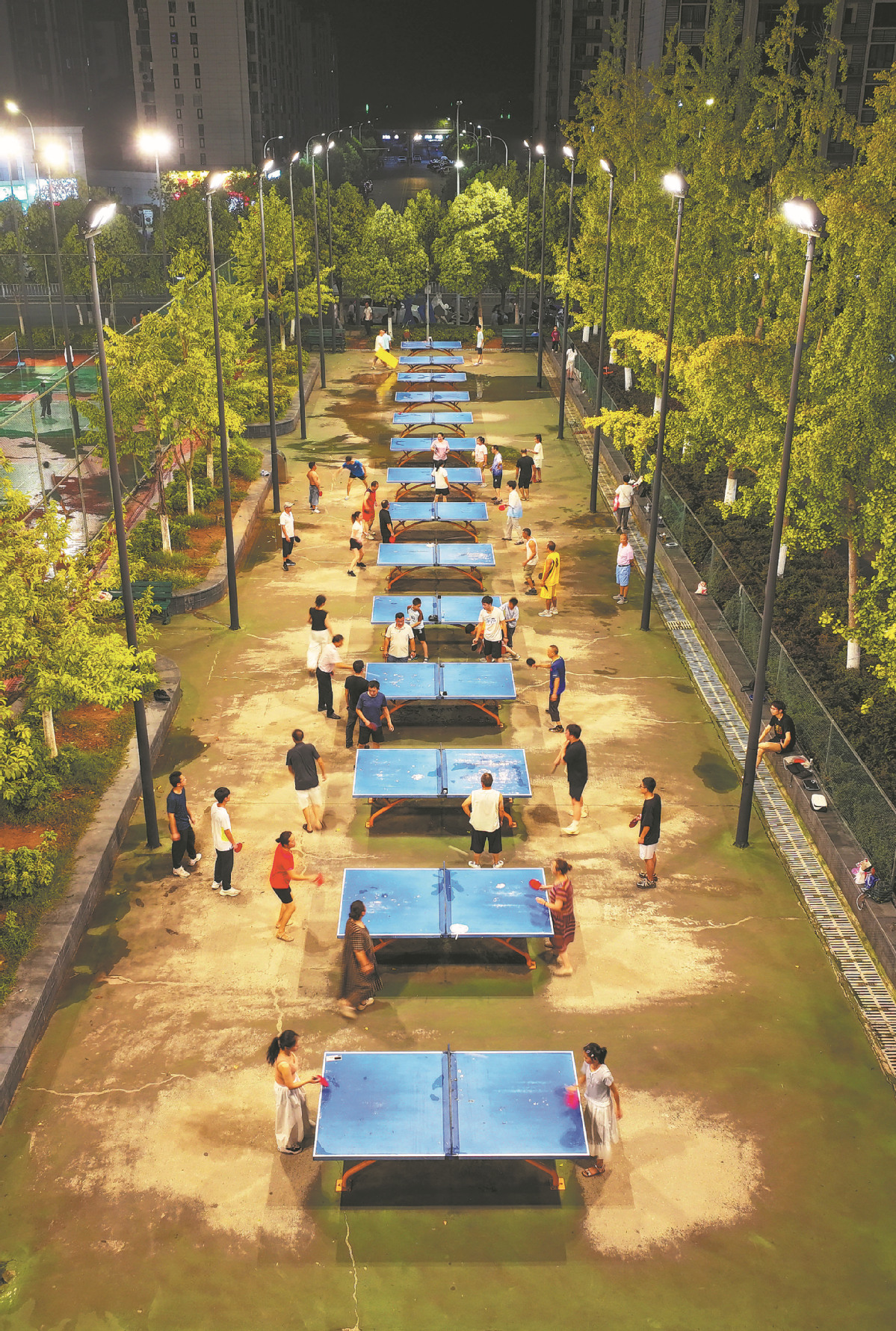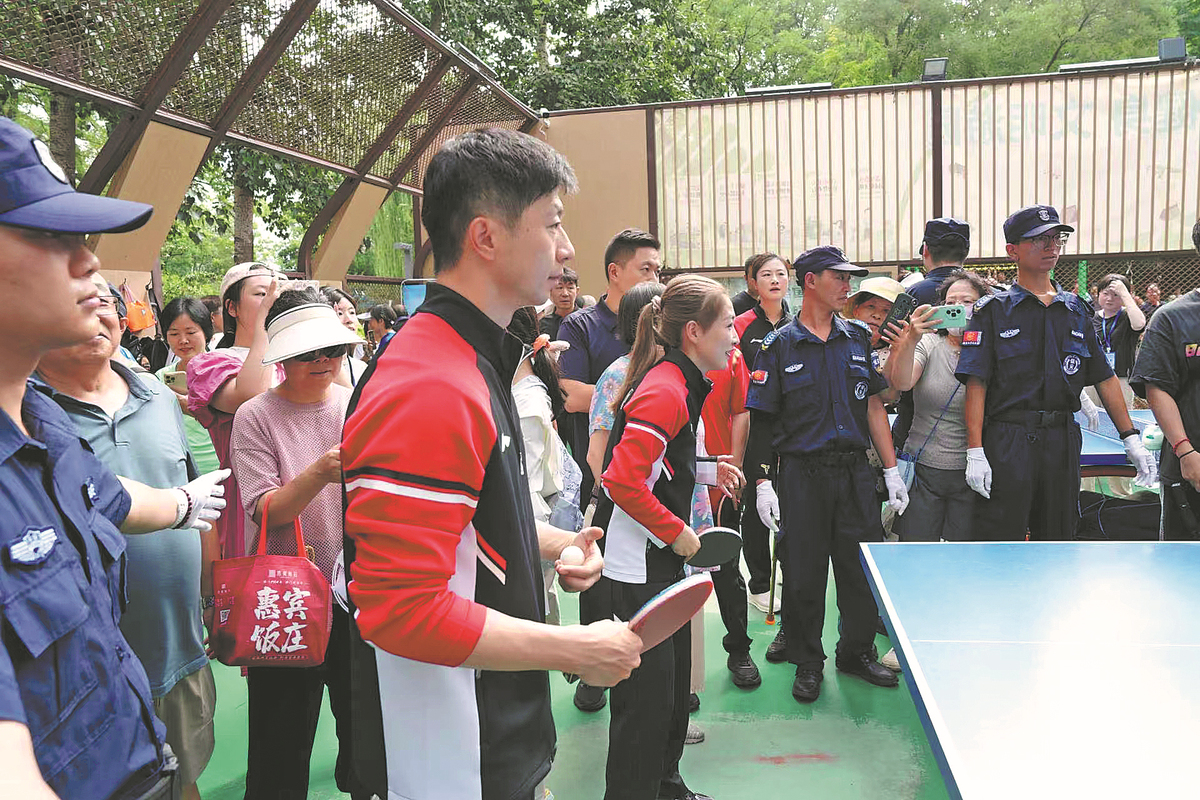
Sunlight slanted across the cobblestones of Beijing's Longtan Lake Park, catching the edges of ping pong tables where the rhythmic clacking of balls on paddles mixed with laughter. Children leaned over the tables, eyes wide, as Li Yunliang, a researcher at the Chinese Academy of Sciences, demonstrated how spin could make a ball curve and dance.
"It's not just the bounce," Li said. "It's the airflow caused by the spin — topspin, backspin, each one changes the flight completely."
Fluid dynamics, usually trapped in textbooks, was suddenly alive in the children's hands.
This was part of "Bringing Ping Pong to Communities and Parks", a public welfare program launched in 2023 by the Ministry of Housing and Urban-Rural Development and the General Administration of Sport of China.
The project aims to embed ping pong tables and small fitness facilities into local neighborhoods, creating a "15-minute fitness circle" around residents' homes.
Olympic champions Ma Long, Li Xiaoxia, Ding Ning, and Liu Shiwen joined in, sharing tips and high-fives with over a hundred local residents.
"Table tennis isn't just a sport," Ma said. "It strengthens the body, sharpens focus and teaches kids how to handle both victory and defeat."
Its deep roots in Chinese culture make it the perfect bridge between competitive achievement and public engagement, Ma said.
Since the initiative began, roughly 38,000 new tables and 135,000 other fitness facilities have been installed nationwide. Nearly 14,000 competitions have drawn over 1.3 million participants. But, behind the numbers is a story of community, curiosity and the simple joy of a ball bouncing across a table in the morning sun.
A short walk away, at the Longtan Central Lake table tennis court, the action continued. As a pilot site for the same initiative, the two new courts added in 2023 — with 17 tables in total — have become a hub for fitness and friendly competition, drawing players from Dongcheng as well as neighboring Xicheng, Chaoyang and Fengtai districts.
Wang Liguo, a local umpire from the city's Haiyuncang Community, has seen the transformation firsthand. "Table tennis in Beijing is growing stronger every year. More people are playing, skills are improving and everyone knows the rules better," he said. "In our community, there are six outdoor tables downstairs and six indoors — residents can just step out of their apartments and start playing."
Since the initiative began, Dongcheng has invested heavily in grassroots sports facilities, creating 166 table tennis halls and 198 courts covering more than 57,000 square meters. Annual events like the "Harmonious Cup", now in its 19th year, draw dozens of teams and nearly a hundred players.
For young players like 18-year-old Zhi Yuelun, these community courts are more than just spaces to play — they are a lifeline. Every Saturday, he practices for two hours, surrounded by neighbors who double as teammates.
"Playing table tennis has made me more confident and helped me meet new people," Zhi said. "With the pressure of schoolwork, it's my way to relax." Last year, he even clinched the championship at the Longtan Central Lake Competition.

Table tennis hub
In Anshan, Liaoning province, the city is still and quiet at six in the morning. Streets are nearly empty, but the table tennis courts in the parks are crackling with energy.
This city, home to Olympic champions Ma Long, Li Xiaoxia and Guo Yue, has seen a steady growth in enthusiasm for table tennis, turning morning park routines into vibrant community gatherings.
At Yongle Park in Tiexi district, one outdoor, floodlit court stands out, hailed by players as the best in all of Anshan. Thirty-five standard tables, professional shadowless lighting, rubberized floors, stone-and-wood benches, and surrounding nets create an environment where enthusiasts can play from dawn until nearly 10 pm.
The court's upgrade came last year, when Anshan hosted the program's first national outdoor invitational by the Chinese Table Tennis Association. Nearly 2,000 participants turned out, and the Tiexi district government invested in the facility to meet both competition and nighttime practice needs.
Guo Xiao'ou, director of the Tiexi district bureau of culture and tourism, explained that every detail — from the choice and height of the lights, to installing poles without harming the ground or greenery, and even the placement of benches — was meticulously planned, with input from players and the community.
"Building artificially lit outdoor courts is a clear example of 'small facilities' serving 'big public needs'," she said. "This program has sparked enthusiasm for fitness, turning Yongle Park into a 'happy park' in the local neighborhood."
For residents like He Baiqin and her spouse, living nearby means table tennis is just a short walk away. Since the lighting was installed, more young players and children have joined evening sessions. "Life is comfortable now, pensions are enough, and playing here with everyone every day is such a joy. Our happiness index is very high," she said.
Young players are part of this energy too.
Ten-year-old Qu Yumo often practices at Yongle Park and idolizes Ma Long, just like siblings Bai Yuhe and Bai Yuzan, who are also regulars there.
The "Bringing Ping Pong to Communities and Parks" activities have given them a space to compete, learn and make friends. Qu, who has won fifth place nationally and first in Anshan, says: "Ping pong brings me so much happiness. My classmates are always so envious when they hear about my results!"
Sun Zhiying, 78, head of Yongle Park Ping Pong Station and a two-time men's singles champion in the Liaoning Provincial Disabled Table Tennis Competition, embodies the sport's intergenerational appeal.
Despite physical challenges, his passion is undiminished. The station's WeChat group is full at 500 members, and Sun personally buys prizes and hires a drone team to record matches, turning every game into a cherished memory.
Shi Haimei, chair of the Anshan Table Tennis Association, often works late into the night organizing events. "The program has fueled Anshan's table tennis growth," she said. "Grassroots competitions have won the hearts of the people. From five-year-olds to octogenarians, everyone joins in."
Parks across China now echo with a sound that speaks of sport, science and society converging.
Through grassroots enthusiasm, upgraded facilities, and national initiatives, the "Bringing Ping Pong to Communities and Parks" program is transforming ordinary mornings into celebrations of skill, camaraderie and joy, proving that table tennis is more than a game — it is a heartbeat of the community.


